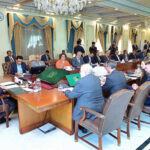UNITED NATIONS, Oct 30 (APP): Pakistan has told the United Nations that
discriminatory nuclear cooperation policies of some major powers — an obvious reference to the U.S.-India nuclear deals — had accentuated the asymmetry in fissile material stocks in South Asia, and creating insecurity in the region.
Speaking in the General’s Assembly’s Disarmament and International
Security Committee, Ambassador Tehmina Janjua, permanent representative of Pakistan to the United Nations in Geneva, said these discriminatory policies were undermining international non-proliferation norms in pursuit of power and profit, and thus leading to insecurities and imbalances.
Regrettably, she said, there was no opposition amongst the Nuclear
Suppliers Group (NSG) members that comprised of some of the most ardent supporters of the Non-Proliferation Treaty and strongest critics of the so-called “lack of progress in the Conference on Disarmament (CD)”.
“It is for these reasons that Pakistan has been obliged to take a stand
against nuclear selectivity, discrimination and exceptionalism,” the Pakistani envoy said, adding, “No country can be expected to compromise on its fundamental security interests for an instrument that is cost free for all other concerned countries.”
Reaffirming Pakistan’s opposition to the Fissile Material Cut-off Treaty
(FMCT), Ambassador Janjua called the establishment of a Group of Governmental Experts on the treaty an “ill-conceived effort” that failed to produce any consensus recommendation. Pakistan, she said, does not support weakening of the the role of Conference on Disarmament (CD) through General Assembly-led non-universal processes that are divisive and not agreed by consensus.
“We wish to reiterate that such measures are contrary to the recognized
international position adopted by consensus that the CD is the single multilateral negotiating forum for disarmament,” she added.
In her statement, Ambassador Janjua also said that the shared quest to
control, regulate and eventually reduce conventional and non-conventional arms had always required agreed and effective negotiating mechanisms. Accordingly, the most consequential and consensual architecture for those negotiations had been created by the United Nations in the last century.
The primary purpose of creating the Conference on Disarmament, she said,
was nuclear disarmament, an agenda item on which no progress had been for the past 32 years, made owing to the positions of some major Powers.
The leading critics of the Conference were themselves responsible for
dragging their feet on the most important issues of nuclear disarmament, negative security assurances, and preventing an arms race in outer space, the Pakistani envoy said.
Those countries, she went on, had played a major role in ensuring the
Conference inactivity for decades and had stalled deliberations in the Disarmament Commission as well.
Their self-righteous concerns were limited to progress on a single issue
in the Conference, with no interest in the other three core issues on its agenda, she said, adding that to make progress in the Conference and other parts of the disarmament machinery, it was essential to take into account the security concerns of all States.
Pakistan's National News Agency





